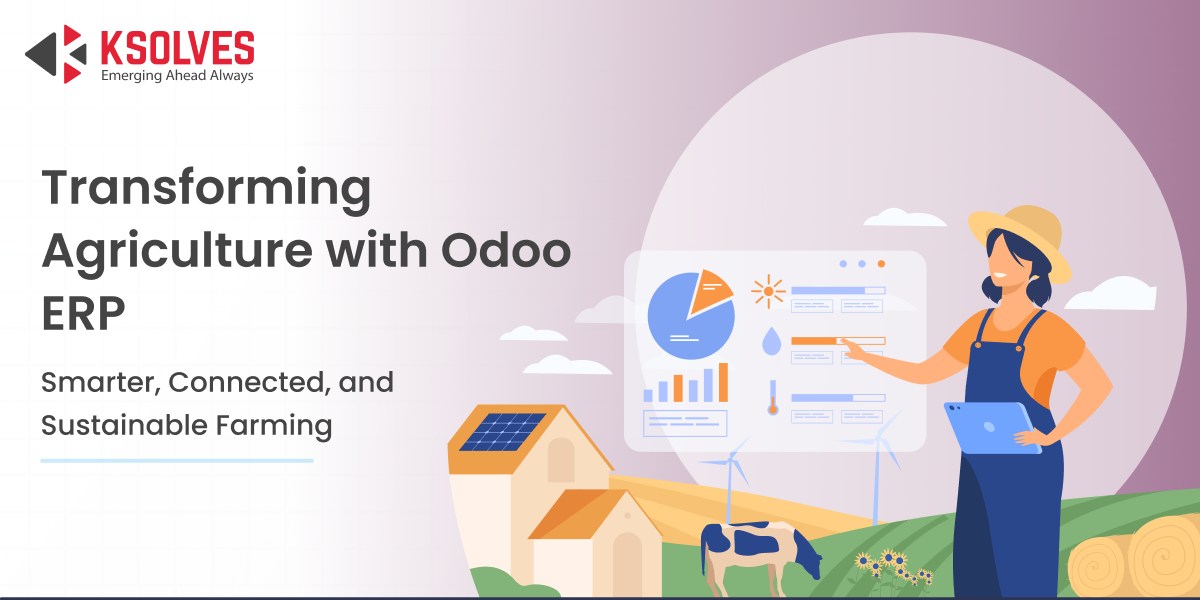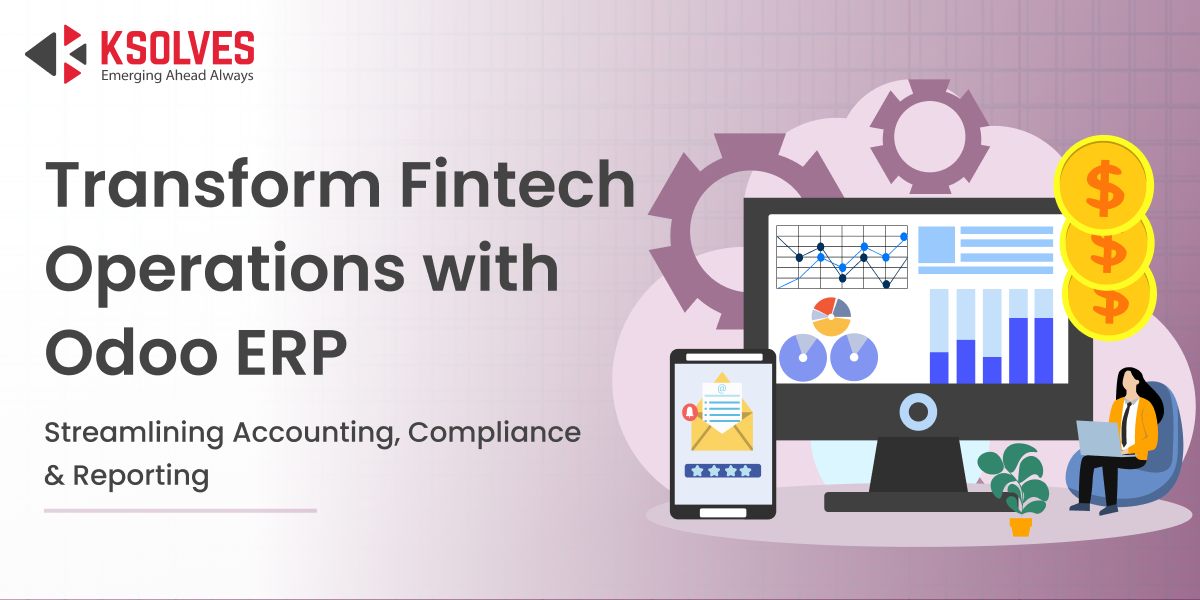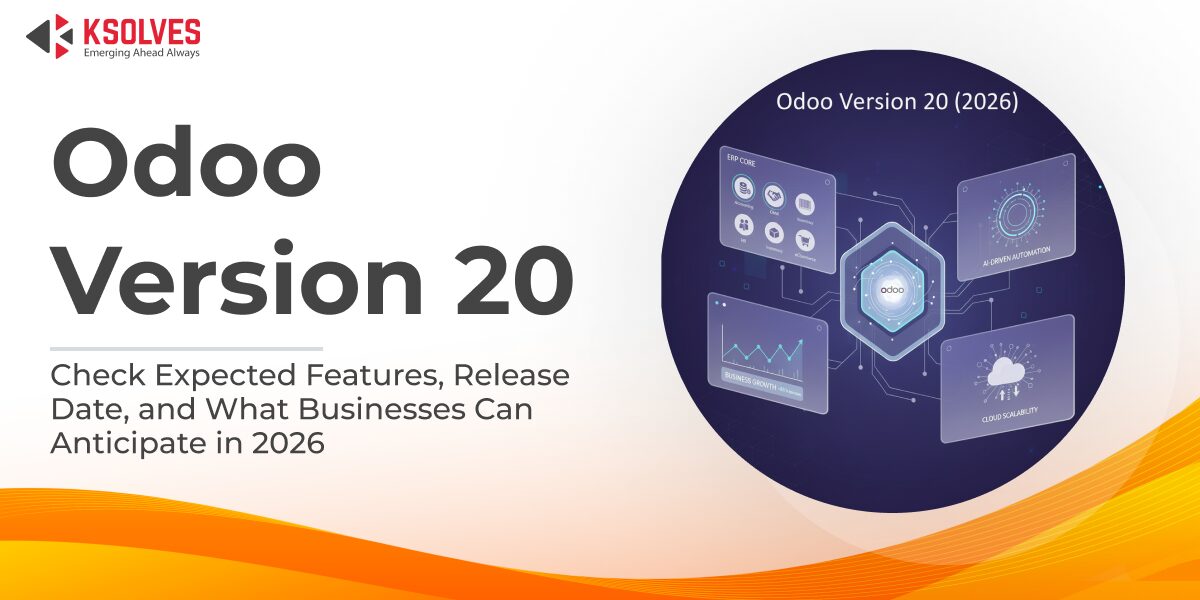Odoo ERP for Agriculture: Managing Crops, Inventory, and Supply Chains in One Platform
Odoo
5 MIN READ
November 12, 2025
![]()

Agriculture has always relied on timing, precision, and resource optimization. However, today’s farmers and agribusinesses operate in a far more unpredictable world — climate uncertainty, volatile commodity prices, labor shortages, and increasing input costs all create complex challenges.
At the same time, the global agri-tech market is accelerating rapidly, expected to reach USD 30+ billion by 2030, driven by digital adoption, automation, and AI-enabled farm management tools. Yet, despite this growth, many agricultural businesses still manage crop cycles, inventory, finances, and distribution through spreadsheets or disconnected software, often resulting in inefficiencies, higher risks, and missed opportunities.
That’s why the future of farming is digital. Odoo ERP brings every agricultural process, including crop management, inventory control, logistics, and finances, onto one connected platform. It helps agribusinesses move from guesswork to data-driven decisions, turning traditional operations into intelligent, efficient ecosystems that can scale and adapt with ease.
In this blog, we’ll explore how Odoo ERP transforms agricultural operations, from managing crops and inventory to streamlining supply chains, all within a single, integrated platform.
Why Agriculture Needs an Integrated ERP System?
Many agricultural businesses still rely on a patchwork of tools, such as spreadsheets for crop data, separate systems for inventory, and standalone software for accounting. This disconnected setup creates data silos, manual errors, poor traceability, and slower decision-making, ultimately impacting yield and profitability.
An integrated ERP like Odoo unifies all agricultural operations into one centralized system, creating a single source of truth for the entire farm or agribusiness value chain. Instead of juggling spreadsheets and disconnected software, teams gain real-time access to accurate, actionable data across every stage of production.
With Odoo ERP for Agriculture, businesses benefit from:
- End-to-end traceability, from seed procurement to final sale.
- Real-time visibility into inventory, production, and logistics.
- Accurate forecasting for yield, costs, and resource needs.
- Centralized record-keeping for compliance, certifications, and audit-ready reporting
- AI-powered forecasting for crop yield, input requirements, labor planning, and cost management
By unifying data and workflows, Odoo turns everyday farming into an intelligent, connected operation, one where decisions are faster, risks are lower, and efficiency grows season after season.
Odoo ERP: A Modular Foundation for Agri-business
Modern agri-businesses(Agri-Enterprises) need flexibility – every farm, cooperative, or processing unit operates differently. Odoo ERP delivers exactly that with its modular, scalable architecture, allowing organizations to implement only the applications they need and expand as operations grow. Each module works independently yet integrates seamlessly with others, creating a unified management ecosystem.
Key Odoo modules that empower agricultural operations include:
1. Inventory & Purchase
Efficient farm operations rely on timely access to seeds, fertilizers, machinery parts, and packaging supplies. Odoo’s integrated Inventory & Purchase modules help agriculture businesses:
- Track farm inputs and stock levels in real-time.
- Optimize storage, transfers, and warehouse visibility.
- Streamline vendor management and purchase approvals.
2. Manufacturing
Post-harvest efficiency directly impacts product quality and market value. With Odoo’s Manufacturing module, agriculture businesses can:
- Streamline cleaning, grading, processing, and packaging.
- Automate work orders and production schedules.
- Manage Bills of Materials (BOM) for value-added products.
- Ensure consistent quality control and traceability.
Also read: How Odoo ERP Streamlines Manufacturing: From Raw Materials to Delivery
3. CRM & Sales
Effortlessly manage leads, customer contracts, and distribution channels in one place. With Odoo CRM and Sales, agribusinesses can track every order, from first inquiry to final delivery. This ensures complete visibility, faster conversions, and stronger customer relationships.
Also read: Effortless Customer Management with Odoo CRM
4. Accounting
Automate journal entries, budgeting, and expense tracking. Odoo also supports multi-currency and multi-company setups, ideal for exporters or cooperatives.
Also read: Comprehensive Guide to Odoo Accounting Features
5. IoT & Field Service
Integrate soil sensors, irrigation systems, and GPS-enabled equipment directly with Odoo. Track real-time field conditions, automate irrigation decisions, and deploy field teams efficiently, boosting productivity and supporting precision farming practices.
Also read: Odoo Field Service Module for End-to-End Efficiency
Being open-source and API-ready, Odoo can integrate with IoT networks, weather forecasting APIs, satellite mapping tools, and mobile data collection apps. This interoperability makes it an ideal digital backbone for precision farming, sustainable resource use, and supply chain visibility – all in one connected platform.
How Odoo ERP Transforms Agriculture Business
1. Crop Management with Odoo
Efficient crop management depends on precise planning, timely execution, and continuous monitoring. Odoo ERP brings all three together in one place. With Odoo’s Planning and Project modules, agribusinesses can manage complete crop lifecycles, from soil preparation and sowing to harvesting and yield analysis.
With Odoo, farmers can:
- Record key agronomic data such as seed varieties, soil conditions, fertilizer types, and irrigation schedules.
- Allocate labor and machinery to specific fields or crop cycles, ensuring optimal resource utilization.
- Log pesticide and nutrient applications to maintain compliance and improve traceability.
- Capture and analyze yield data to measure performance and refine future planting strategies.
When integrated with IoT sensors or drones and and precision-farming tool, Odoo can automatically collect environmental data like soil moisture, temperature, and weather patterns. This enables real-time decision-making.
This integration empowers farmers and managers to move from reactive crop management to proactive, data-driven farming, improving productivity while conserving resources.
2. Smarter Inventory and Resource Control
Inventory management in agriculture extends far beyond tracking products. It’s about ensuring the right inputs, tools, and produce are available at the right time. The Odoo Inventory module provides full visibility and control over every resource, from fertilizers and seeds to equipment and harvested goods.
With Odoo, farms can:
- Monitor stock levels in real time across multiple warehouses, fields, or processing units.
- Use batch and lot tracking to maintain complete traceability of inputs and produce, crucial for meeting safety and compliance standards.
- Automate reordering rules so essential materials are replenished before they run out.
- Streamline storage and logistics through barcode scanning, warehouse routing, and expiration date tracking.
This streamlined inventory approach reduces waste, avoids overstocking, and keeps farming operations running smoothly during peak seasons. By syncing resource availability with real production needs, Odoo helps agribusinesses cut costs and boost supply-chain efficiency.
With the global agritech market expected to surpass $22B by 2025, digital farm-management systems are shifting from advantage to necessity. As traceability and compliance demands rise, ERP-powered inventory automation is becoming essential for modern agriculture to stay competitive and resilient.
3. Optimizing the Agricultural Supply Chain
An efficient supply chain is the backbone of any successful agribusiness. Odoo ERP ensures every stage, from procurement to delivery, runs seamlessly. By connecting purchase, inventory, logistics, and sales modules, Odoo provides a unified view of the entire agricultural supply chain.
With Odoo, organizations can:
- Streamline procurement by automating vendor selection, purchase orders, and approval workflows, ensuring timely sourcing of seeds, fertilizers, and equipment.
- Synchronize inventory and production data to maintain accurate stock levels and prevent shortages or over-purchasing.
- Optimize transportation and distribution using the Fleet Management module to track vehicles, routes, and delivery performance in real time.
- Enhance shipment accuracy through Barcode and RFID integration, reducing manual errors and improving traceability.
This connected workflow minimizes post-harvest losses and accelerates the movement of produce from farms to markets. The result is fresher products, lower operational costs, and a more reliable experience for customers and distributors alike.
4. Financial and Compliance Management
Agribusinesses face fluctuating input costs, multi-currency trade, and strict regulatory frameworks. Odoo Accounting streamlines financial processes with automation for journal entries, expenses, and reconciliations, reducing manual work and errors.
Key features include:
- Multi-company and multi-currency support, ideal for exporters and cooperatives.
- Grant and subsidy tracking to maintain transparency and compliance with government schemes.
- Customizable financial reports that meet local and international standards.
- Integration with compliance tools for certifications like GAP, HACCP, or ISO.
By centralizing all financial data, Odoo ensures accountability, simplifies audits, and enables smarter, data-backed budgeting and cost control.
5. Analytics and Forecasting with Odoo
In agriculture, informed decisions depend on clear, timely data. Odoo ERP provides powerful reporting and visualization tools that help managers track operational, financial, and production performance in one place. With Odoo’s built-in dashboards and customizable reports, users can monitor KPIs such as yield per hectare, resource utilization, input costs, sales trends, and profitability.
For advanced visualization, tools like Dashboard Ninja with AI enhance Odoo’s analytics capabilities. It allows users to build interactive reporting dashboards in minutes for real-time insights across farms, warehouses, and supply chains.
Odoo’s rule-based forecasting and trend analysis capabilities help predict:
- Track key KPIs like yield per acre/hectare, resource usage, input costs, and sales performance.
- Analyze crop cycles, machinery utilization, and workforce efficiency.
- Forecast inventory needs, seasonal demand, and cost fluctuations.
- Generate custom financial and operational reports instantly.
By consolidating financial, production, and environmental data, Odoo transforms everyday operations into actionable insights. This improves planning accuracy, reducing waste and boosting efficiency across the agricultural value chain.
6. Quality Control and Sustainability Management
Maintaining consistent quality and environmental responsibility is now a core requirement for agricultural businesses. Odoo’s Quality module enables farms and food processors to define inspection points, monitor test results, and track product quality at every stage, from raw input to packaged goods.
Beyond product standards, Odoo’s unified data architecture supports monitoring of key sustainability metrics such as water consumption, fertilizer and chemical usage, energy efficiency, and waste levels. This enables farms and processors to meet global ESG benchmarks, comply with certifications like GAP, HACCP, and ISO, and demonstrate transparent, responsible operations to regulators and buyers.
This ensures that farms not only stay compliant but also build trust with consumers and partners through transparent, responsible practices.
Integrations that Strengthen Agri Operations
Modern agriculture thrives on connectivity. Odoo’s open, API-friendly architecture makes it easy to integrate with a wide range of agri-tech solutions. These integrations extend Odoo’s capabilities beyond core ERP functions, enabling real-time monitoring and smarter decision-making across the value chain.
With Odoo, agribusinesses can:
- Connect IoT sensors to track soil moisture, temperature, and humidity directly within the ERP.
- Ingest drone and satellite data for analyzing crop health, pest activity, and land utilization.
- Integrate weather APIs to align irrigation and planting schedules with local climate patterns.
- Link eCommerce platforms for direct farmer-to-consumer or B2B sales, reducing intermediaries.
By consolidating operational, environmental, and commercial data, Odoo evolves from a management tool into a connected farming ecosystem. This helps agribusinesses enhance productivity, sustainability, and market responsiveness.
How Our Odoo Integration Services Help Agribusiness
At Ksolves, we help agribusinesses unlock the full potential of these integrations through our Odoo Integration Services. Our experts connect Odoo ERP with IoT devices, weather intelligence platforms, and satellite data systems to deliver a unified, data-driven view of your operations.
Whether it’s automating real-time field monitoring, enabling predictive insights, or linking Odoo with external marketplaces and logistics tools, we ensure seamless interoperability tailored to your workflows. With our deep Odoo and agri-domain expertise, we transform disconnected systems into a single ecosystem that drives efficiency, traceability, and sustainability across your agricultural operations.
Final Words
The agriculture industry is evolving rapidly, and technology like Odoo ERP is at the heart of this transformation. Odoo empowers agribusinesses to operate with greater precision, visibility, and sustainability. Its modular design and integration capabilities make it the perfect ally for building a connected, data-driven farming ecosystem.
As an Odoo Gold Partner and Odoo Best Partner India 2025, Ksolves helps agriculture enterprises harness the full potential of Odoo ERP. Our end-to-end Odoo Development services, spanning development, customization, integration, implementation, and support, ensure that your ERP works the way your business grows.
With Ksolves, you gain more than a technology partner; you gain a trusted ally in digital transformation.
![]()







AUTHOR
Odoo
Neha Negi, Presales and Business Associate Head at Ksolves is a results-driven ERP consultant with over 8 years of expertise in designing and implementing tailored ERP solutions. She has a proven track record of leading successful projects from concept to completion, driving organizational efficiency and success.
Share with